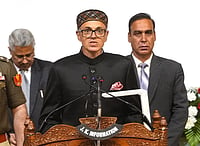We begin today’s show in Pakistan, where people in the northwestern city of Peshawar are burying their dead after a Taliban attack at a school killed at least 145 people — including 132 children — in the Taliban’s deadliest attack to date. According to the Pakistani army, Tuesday’s attack was carried out by seven Taliban attackers against the Army Public School, which both military and civilian girls and boys attend. Prime Minister Nawaz Sharif has declared three days of mourning and convened a meeting of all parliamentary parties in Peshawar to discuss the response to the attack. The army has reportedly launched attacks at militants in the region. The Taliban said they targeted the children of military families in retaliation for Pakistan’s anti-Taliban campaign in North Waziristan. We speak to British-Pakistani political commentator Tariq Ali and Asad Hashim, Al Jazeera English web correspondent in Pakistan.
'This Has Very Little To Do With Religion'
'Afghan Taliban feel that the main target should be NATO and the West, and not the Pakistani state, on which, after all, they have relied for a long time'

This is a rush transcript. Copy may not be in its final form.
JUAN GONZáLEZ: We begin today’s show in Pakistan, where people in the northwestern city of Peshawar are burying their dead after a Taliban attack at a school killed at least 145 people, including 132 children, in the Taliban’s deadliest attack to date. According to the Pakistani army, Tuesday’s attack was carried out by seven Taliban attackers against the Army Public School, which both military and civilian girls and boys attend. One of the surviving students described the scene of the attack .
SURVIVING STUDENT: [translated] As soon as the firing started, our teacher made us sit in a corner and told us to lower our heads. After around an hour, when the firing subsided a little, Army personnel came and rescued us. When we came out, we saw in the corridors our friends who had been shot three or four times, some dead and some injured. Their blood had spilled all over the place.
AMY GOODMAN: Prime Minister Nawaz Sharif has declared three days of mourning and convened a meeting of all parliamentary parties in Peshawar to discuss the response to the attack. The army has reportedly launched attacks at militants in the region. The Taliban said they targeted the children of military families in retaliation for Pakistan’s anti-Taliban campaign in North Waziristan. Since June, at the urging of the United States, Pakistan has waged a massive offensive in the region, which coincided with the resumption of U.S. drone strikes.
JUAN GONZáLEZ: Pakistani Taliban spokesman Mohammad Khurasani said the militants had been forced to launch the attack in response to army attacks. In a statement, Khurasani said, quote, "We targeted the school because the army targets our families. We want them to feel our pain." Pakistani education activist and Nobel Peace Prize activist Malala Yousafzai said she was heartbroken by the attack.
MALALA YOUSAFZAI: My family and I are heartbroken after hearing the news that more than a hundred innocent children and teachers have lost their lives in this recent attack on a school in Peshawar. And we stand with all those families and all those children who are injured right now and who are suffering through this big trauma. And now it is time that we unite. And I call upon the international community, leaders in Pakistan, all political parties and everyone, that we should stand up together and fight against terrorism, and we should make sure that every child gets safe and quality education.
AMY GOODMAN: That’s Malala Yousafzai speaking in Birmingham Tuesday. Earlier this month, she was awarded the Nobel Peace Prize, the youngest ever. In 2012, she was shot in the head by a Taliban gunman who boarded her school bus. She survived and continues to campaign for the right of girls to go to school.
For more on the attacks, we’re joined by Tariq Ali, a British-Pakistani political commentator, historian, activist, filmmaker. He is the editor of the New Left Review.
Tariq, welcome to Democracy Now! Can you just respond to this horrific attack with 132 schoolchildren dead, 145 altogether including teachers?
TARIQ ALI: Amy, two things need to be said about this straightaway. This has very little to do with religion. What we are witnessing in Pakistan now is a form of a power struggle going on between militants aligned with the umbrella of pro-Taliban groups known as the Pakistani Taliban Movement, which isn’t a single movement, a struggle between them and the Pakistani—or segments of the Pakistani state to determine who controls the country. And the fact that over the last decade or so the authorities of the state—the military and the political parties, especially those parties sympathetic to the Taliban—have been incapable of or have refused to do anything about it, we now see the results and the impact of that. And that’s the first point.
The second is that we shouldn’t forget for a moment that one reason these Taliban groups have not been dealt with is because sections of the state still feel—even after this atrocity, by the way—that they can’t completely get rid of them because they are linked to the fight in Afghanistan, and the notion of the Pakistani military high commanders being that we need Afghanistan to give ourselves strategic depth—always a nonsensical notion, but it’s now exacting a very heavy price in Pakistan itself. And at the time when the United States went into Afghanistan, I remember writing in The Guardian that one consequence of this massive presence of Western military troops is going to be the destabilization and the advancement of terror inside Pakistan itself.
So, it’s a horrific attack. It can’t be justified. What the Taliban are saying is, of course, true, that they are bombed, that their kids die, and no one says a word. That’s absolutely true. But you cannot justify one crime by committing another.
JUAN GONZáLEZ: And, Tariq, what about this continuing assault on North Waziristan by the Pakistani government, especially as the foreign troops, U.S. troops, in Afghanistan wind down and leave the country?
TARIQ ALI: Well, I think that this is the million-dollar question. Are they going to leave the country? Are they going to take their military bases with them? The latest from there, Juan, is that their military bases are going to stay with a very limited number of troops. But the Afghan Taliban has emerged as the winner in this conflict, and there’s absolutely no doubt in my mind that they are in touch with elements of the Pakistani military apparatus to discuss what to do now. I mean, they’ve been close for a long, long time, and so they will be discussing that, which is why the thing becomes much more complex, because I don’t think the Pakistani military has given up ever on the notion of taking Afghanistan back once the West leaves. And the fact that the Taliban in Afghanistan, with new supporters, has managed to hold the West at bay and defeated them, effectively, politically, if not militarily, is a sign that the Pakistani military has not given up.
AMY GOODMAN: We are also joined, in addition to Tariq Ali, by Asad Hashim, Al Jazeera English correspondent in Islamabad, in Pakistan. Welcome to Democracy Now!, Asad. Talk about the latest there and the response within Pakistan. Asad, can you hear us?
ASAD HASHIM: Yes, I can hear you now. Sorry, you just disappeared for a moment.
AMY GOODMAN: Ah, OK.
ASAD HASHIM: Sorry, I missed your question.
AMY GOODMAN: If you can talk about the latest in Pakistan right now and the response to this horrific massacre?
ASAD HASHIM: Well, the public response has been, as you can imagine, one of shock and outrage and horror. As Mr. Ali said, I mean, this was just something that was completely unprecedented, in a way. I mean, the Taliban has been, and their allies have been, carrying out attacks against civilian targets in Pakistan for many years now, but we’ve very rarely seen something on this scale. And it’s not just about the scale, I think; it’s also about the fact that it was children who were killed in execution-style killings, really, at the school. They lined them up in the auditorium in rows and face down, and then were shooting them in the head. And that really has brought about a visceral response from Pakistanis. So, today, really, the day was spent in sort of like numb horror, I think. Even now, most people who are in offices or in shops—a lot of shops were closed today, even though there was not necessarily a strike called of any kind and this wasn’t being enforced. People literally just did not want to work.
On the political front, there was the multi-party conference, the all-party conference, which you spoke about earlier and alluded to. That ended a little while ago, but it not really ended up with anything concrete. I mean, Prime Minister Nawaz Sharif, really, held a press conference with all of the leaders beside him, which was a show of unity, but they didn’t say anything concrete. They essentially just said, "We will come up with a plan in the next week that will be a united plan to resolve the issue of extremism," which is a really nothing statement, to be honest.
JUAN GONZáLEZ: Asad, I wanted to ask you, the—could you talk a little bit more about the [TTP], the group that’s claimed responsibility for the attack, and its relationship to other insurgent groups? Because there are reports that the Taliban in Afghanistan have condemned this attack.
ASAD HASHIM: Yes, yes. So, the Taliban in Afghanistan do appear to have condemned the attack, and that’s interesting in and of itself, because the Tehrik-i-Taliban Pakistan owes its allegiance to the Afghan Taliban and to Mullah Omar and, through them, to al-Qaeda. And this is very interesting because the TTP has actually suffered in recent months from a number of divisions and factions that have formed within it due to internal leadership issues, but also due to the issue of certain commanders pledging allegiance to the Islamic State, which obviously is a competitor in the global terrorism game, I suppose, to al-Qaeda. And so, you had the TTP actually suffering for its allegiance to the Afghan Taliban, and to have the Afghan Taliban now condemn this attack is very significant for them.
The TTP itself is a group that was formed—it’s an umbrella organization of terrorist groups that were formed in 2007 under Baitullah Mehsud. In the last year or so, we’ve seen it considerably weakened. As I said, there were leadership issues when they elected their new leader, which is Mullah Fazlullah. Now, he’s not from the tribal areas, which is where the group mainly operates and is from and where it draws its strength from. He’s from an area called Swat, where he conducted a very successful campaign against the Pakistani state. And I guess on the back of that, he was given the leadership role. But he’s—in the time that he’s been in office, since November last year, he has seen the TTP really sick several times. He’s had several—he’s had to fire several commanders who were not willing to follow him. So we’ve seen the TTP weaken to a degree.
The other reason why I would say we’ve seen the TTP weaken is because, since Zarb-e-Azb, since the military operation began on June 15th in North Waziristan, which you were referring to earlier, we were already expecting a large number of blowback attacks in urban areas, as we have seen after similar operations in the past. And this time, we really have seen very limited attacks of that kind. There was the attack in the Wagah border post that took place last month where about 60 civilians were killed. That was the first really large-scale attack. And this one is—as I said, it’s unprecedented in its scale—141 people killed, 143 now, I believe, with the death toll rising as people succumb to their injuries. This is the worst terrorist attack in Pakistan’s recent history.
AMY GOODMAN: Tariq Ali, in 2012, one of Pakistan’s leading English daily newspapers revealed a large majority of high-profile terrorism cases has resulted in acquittals in the country’s largest province. The piece appeared in The Express Tribune and was headlined "High-profile cases in Punjab: 63% terror suspects acquitted." Could you explain how the Pakistani state, and in particular the judiciary, have dealt with the rising number of militant attacks in the country?
TARIQ ALI: Amy, this is absolutely true, what The Express Tribune reported. And I would add to it that the fact that his own bodyguard killed the late governor of the Punjab, Salmaan Taseer, and were—and the guy is still awaiting punishment, and the fact that many lawyers in the court came to welcome the assassin of the governor is an indication of how deep the rot has gone. Now, a number of senior magistrates and judges in charge of the terrorism courts are basically scared. A, witnesses who come before them are threatened, so they withdraw their testimony. That leaves them with no legal basis on which to punish or sentence the perpetrators, and they have to release them. But I think a very large number of judges in these courts are scared. They’re scared that if they do their duty, they’ll be shot dead. And the inability of the state to protect them is something which a number of people have remarked on.
If I could just add one thing to what your man in Islamabad was saying, that it’s not the first time that the Afghan Taliban have attacked their Pakistani so-called supporters. They did so some years ago when there were other atrocities carried out. And the basic difference between the two groups is that the Afghan Taliban feel that the main target should be NATO and the West, and not the Pakistani state, on which, after all, they have relied for a long time.
AMY GOODMAN: Well, we’re going to leave it there. I want to thank you both for being with us. Of course, we’ll continue to cover this horrific story, this massacre that has taken place in Peshawar, 132 schoolchildren killed. Tariq Ali is a British-Pakistani political commentator, historian, filmmaker, novelist, editor of the New Left Review. And thanks so much to Asad Hashim, Al Jazeera English web correspondent in Pakistan, based in the capital, Islamabad. He recently co-authored two pieces for Al Jazeera, one headlined "Breaking Down the Tehreek-e-Taliban [Pakistan]" and the other titled "Children massacred in Pakistan school attack."
Courtesy: DemocracyNow!




















